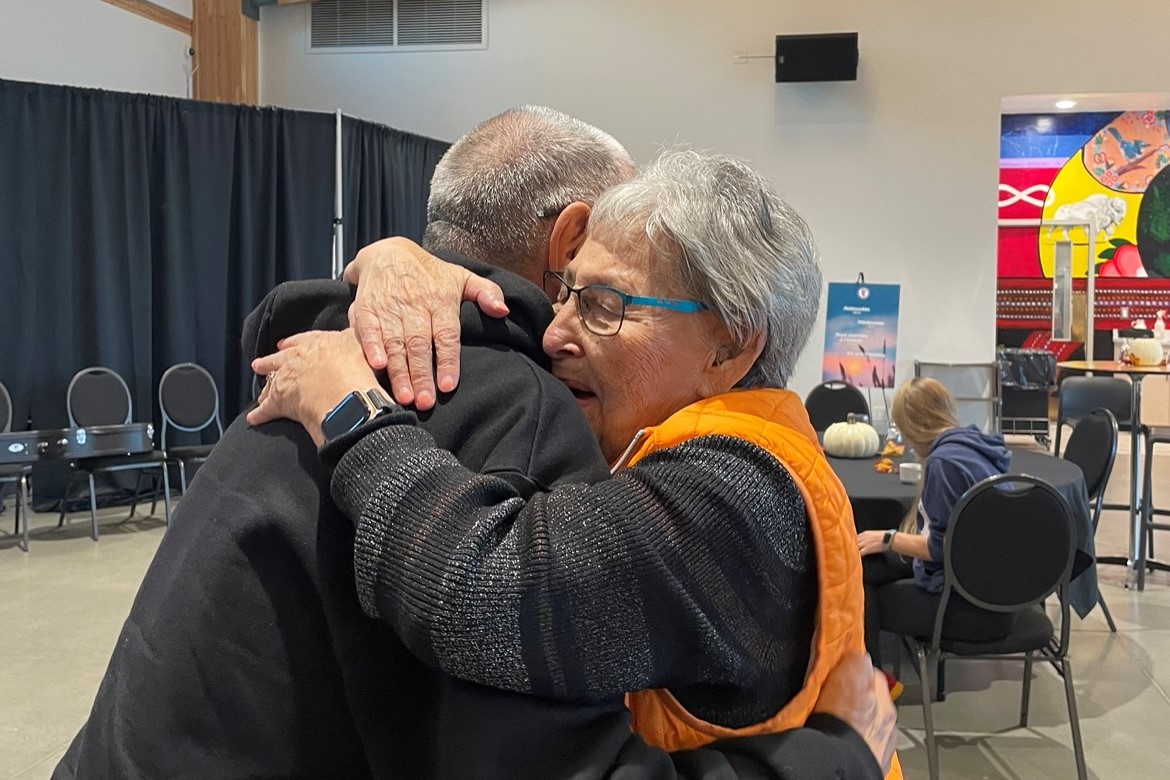Looking for more Indigenous news? Find our stories here.

Angie Crerar finally felt safe.
“For the first time in my life, I felt safe, I felt at home and I was surrounded by people who had been through something I had been through,” said Crerar, a survivor of St. Joseph’s Indian Residential School in Fort Resolution, N.W.T.
“I was able to tell some of the head and the heart pains that I hid for many years, to be able to get rid of that garbage we were living with and to trust each other immediately.”
The 87-year-old attended a gathering for Métis residential school and day school survivors hosted by the Otipemisiwak Métis Government — formerly the Métis Nation of Alberta — at Métis Crossing in Smoky Lake, Alta.
The gathering was a long time coming for many survivors and Crerar said it was the first of its kind in the province.
“It was so wonderful because it was only for (Métis) survivors … we got a call from our (former) president and we told her that we needed some help, we needed to meet with other survivors so they found us.”
Lorna Dancey, truth and reconciliation director with the Otipemisiwak Métis Government, is one of the people who helped put together the gathering and find survivors.
“It was really important to bring them together to listen, that was the main goal,” said Dancey.
“They really wanted to branch out and meet other survivors and have a healing gathering that focused specifically on our survivors.”
The gathering lasted three days and included sharing, outdoor art therapy, language-based learning and wildlife tours.
“We had a healing circle the first night, some shared, some didn’t but they really had a safe space with each other because they understood each other’s trauma,” said Dancey.
“It really opened them up to be vulnerable knowing that there was no judgment and by the end I was in my room and I could hear them giggling and laughing.”

Dancey said residential school survivor Melvin Whitford played a big role in fueling the need for a gathering.
“(Melvin) asked me to come to his house… and there’s his wife, Sandra — I love telling this story — there’s his beautiful wife sitting at the table with him and they’re holding hands and they’re looking at me from across the table — and they call me my girl, which I love — he said ‘My girl, please, please find me someone like me,'” she explained.
“He really wanted to find someone who understood, understands what he’s endured.”
And that’s exactly what happened.
“They were all talking about the food, the treatment, the nuns, the priest and as painful as it was, there really was some healing that happened between all of them,” she said.
“They could talk about it with someone who understood completely what they were saying and the fear of not being believed dissolved because there was proof — it wasn’t just a story, it was other people’s stories.”

While sharing with one another was a big part of the gathering, many residential and day school survivors find sharing to be difficult.
“I told things I’ve never told in my life (at the gathering),” said Crerar. “Not even my children and not even to others because its too painful, I’m not going to tell my kids what happened, I’m going to protect them.”
In recent years, the public’s awareness of residential schools and their lasting impacts has grown, but what’s routinely overlooked is the Métis experience. Dancey said that’s one of the things they’re working on changing.
“In Fort Vermillion, there was St. Henri’s but they also built a school called St. Mary’s and that one was specific for Métis children because they weren’t getting the funding for Métis children that they were for the First Nations children,” said Dancey.
“A lot of people don’t know about that, that’s why it’s so important for our survivors, if they can, share their experiences so we can get more information to help our Métis story be told.”
Crerar moved to Grand Prairie, Alta., in 1966 where she raised four children and dedicated much of her life working for Indigenous people.
She was part of the delegation that went to Rome to meet with Pope Francis and has routinely advocated for support for survivors of residential and day schools — the gathering was an integral part of that.
“It’s hard for us to trust,” she said. “But as we met each other, I just felt at home and felt safe because we all went through the same thing — we need to do this, to meet each other.”
- As Canada’s tax deadline nears, what happens if you don’t file your return?
- Video shows Ontario police sharing Trudeau’s location with protester, investigation launched
- Canada to donate $3M to Ukraine drone production, buy more ammunition
- Investing tax refunds is low priority for Canadians amid high cost of living: poll






Comments